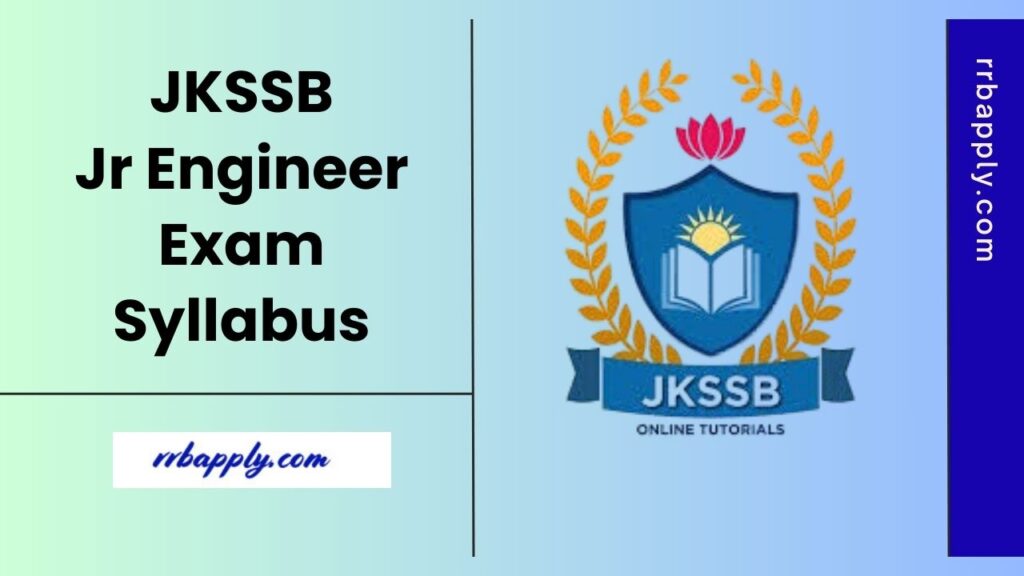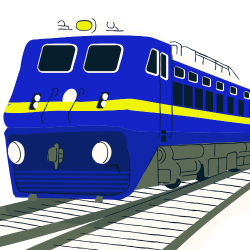JKSSB JE Syllabus 2025: Jammu & Kashmir SSB Junior Engineer Written Exam Pattern & Syllabus is shared here for the willing candidates. The candidates who are preparing for the Junior Engineer Recruitment Test can follow this page during the preparation. JKSSB will conduct the Written Exam in connection to the JE Civil & Electrical Recruitment 2025. Thus, this is the right time to prepare for the upcoming test by going through this page.
JKSSB Junior Engineer Syllabus 2025 Overview
| Recruitment Authority | Jammu & Kashmir Services Selection Board (JKSSB) |
| Advertisement No | 02/2025 & 03/2025 |
| Name of the Post | Junior Engineer Civil & Electrical |
| Vacancy | JE Electrical – 292 Posts JE Civil – 508 Posts |
| Start Date of Application | 05/05/2025 |
| Closing date of Application | 03/06/2025 |
| Total Vacancies | JE Civil – 508 Posts JE Electrical – 292 Posts |
| Job Type | State Govt Jobs |
| Place of Posting | Jammu & Kashmir |
| Application Mode | Online |
| Official Website | jkssb.nic.in |

JKSSB JE Recruitment 2025 Syllabus
Updated JKSSB Junior Engineer Syllabus 2025 is available here. Candidates can see complete details of JKSSB JE Syllabus 2025 and Exam Pattern through this page. In addition the spirants can also download the JKSSB Syllabus Pdf for both the JE Civil & Electrical Exam. Refer JKSSB JE Preparation Tips, study material to crack the selection process easily.
Applicants of JKSSB JE Recruitment can get full Written Exam Syllabus in the below sections. Detailed JKSSB Junior Engineer Syllabus 2025 specifies what to prepare & how to prepare for the test. Therefore postulants must know the updated JKSSB JE Syllabus & Test Pattern before the examination.
Also Check >> JKSSB JE Vacancy Notice Details
JKSSB JE Written Exam Pattern
JKSSB Junior Engineer Written Exam will be a 120 marks exam consisting of MCQ / objective type questions. The Exam Topics on which the Test will be conducted is as under –
| Subjects | No of Questions | Marks |
| Engineering Subjects | 120 | 120 |
- Time Duration of the Examination will be 02 Hours.
- There will be a negative marking of 0.25 marks for each wrong answer.
- The questions will be set in English Only.
Also Check >> JKSSB JE Exam Date / Admit Card Link
JKSSB Junior Engineer Syllabus 2025 for Written Exam
The applicants can find the topics wise JKSSB JE Syllabus 2025 here. The Written Exam is actually a 120 marks offline test on the relevant engineering branch. Here, the topics wise JKSSB Junior Engineer Written Exam Syllabus 2025 is discussed. Hopefully this will help in the preparation.
JKSSB JE Electrical Syllabus
The JKSSB JE Electrical syllabus will contain the questions from the following topics as mentioned below.
| Exam Topics | Syllabus | Marks |
| Electrical Circuits and Fields | Basic concepts: Concepts of resistance, inductance, capacitance and various factors effecting them., Circuit laws: ohms law KCL, KVL, node and mesh analysis, resonance, ideal current and voltage sources, Source conversions Thevenin’s, Norton’s and Superposition and Maximum Power Transfer theorems, Simple Circuit solution using network theorems. Three phase circuits; Ampere’s and Biot-Savart’s laws; inductance; dielectrics; capacitance. | 15 marks |
| Control Systems | Basic control system components; block diagrammatic description, reduction of block diagrams. Open loop and closed loop (feedback) systems and stability analysis of these systems. | 10 marks |
| Electrical and Electronic Measurements | Bridges and potentiometers; PMMC, moving iron, dynamometer and induction type instruments; Extension of range, measurement of voltage, current, power, energy and power factor; instrument transformers; digital voltmeters and multimeters; phase, time and frequency measurement; Q-meters; oscilloscopes. Transducers: measurement of displacement, flow and temperature, Megger. Measurements of active and reactive power, Measurement of Energy. | 15 marks |
| Electronic Devices and Circuits | Energy bands in silicon, intrinsic and extrinsic silicon. Carrier transport in silicon: diffusion current, drift current, mobility, and resistivity. p-n junction diode, Zener diode, tunnel diode, BJT, JFET, MOS capacitor, MOSFET, LED, avalanche photo diode .Small Signal Equivalent circuits of diodes, BJTs, MOSFETs. Simple diode circuits, clipping, clamping, rectifier. Biasing and bias stability of transistor and FET amplifiers. Single-and multi-stage, tuned voltage, operational, feedback, and power amplifiers. Frequency response of amplifiers. Simple op-amp circuits. Filters. Sinusoidal oscillators; criterion for oscillation; single-transistor and op-amp configurations. Function generators and wave-shaping circuits, 555 Timers IC and its applications. Power supplies | 10 marks |
| Digital Electronics and Microprocessor | Number systems: Binary, decimal, octal, hexadecimal, BCD number systems and their conversions, Binary and hexadecimal addition, subtraction multiplication,1’s and 2’s complement methods of addition/subtraction. Boolean algebra, minimization of Boolean functions; logic gates; digital IC families (DTL, TTL, ECL, MOS, CMOS). Combinatorial circuits: arithmetic circuits, code converters, multiplexers, decoders, PROMs. Sequential circuits: latches and flip-flops, counters and shift-registers. ADCs, DACs. Semiconductor memories. Microprocessor (8085): architecture, instruction set, programming, memory and I/O interfacing. Study of peripheral chips- 8251,8155, 8257,8259 | 10 marks |
| Power Electronics and Drives | Semiconductor power diodes, transistors, thyristors, triacs and MOSFETs – static characteristics and principles of operation; triggering circuits; phase control rectifiers; bridge converters – fully controlled and half controlled; Choppers and Inverters; concepts of adjustable speed dc and ac drives. | 10 marks |
| Electrical Machines | Single phase transformer – equivalent circuit, phasor diagram, tests, regulation and efficiency; three phase transformers – connections, parallel operation; autotransformer, Energy conversion principles, Electro-mechanical energy conversion ; DC machines–types, windings, generator characteristics, armature reaction and commutation, starting and speed control of motors; three phase induction motors– principles, types, performance characteristics, starting and speed control; single phase induction motors; synchronous machines – performance, regulation and parallel operation of generators, motor starting, characteristics and applications; servo and stepper motors. Braking of DC and AC motors | 25 marks |
| Power Systems | Basic power generation concepts; transmission line models and performance; cable performance, insulation; corona and radio interference; distribution systems; power factor correction; economic operation; symmetrical components; principles of over-current, differential and distance protection; Generator, feeder, transformer and bus-bar protection, Lightning protection; solid state relays and circuit breakers; Sub-Station Practices, Load frequency control, Tariffs, Earthing. Utilisation of Electrical energy: Illumination, electrical heating and welding, electroplating. | 25 marks |
JKSSB JE Civil Syllabus
The topic-wise syllabus for JKSSB JE Civil Written Examination is as mentioned in the following table.
| Exam Topic | Syllabus | Marks |
| Surveying | Importance of surveying, principles and classifications, measurements of distance and directions, chain surveying, compass surveying, leveling, tacheometry, theodolite, traversing, contouring, plane table surveying, curves. | 10 marks |
| Mechanics and Structural Analysis | Introduction, Concept of rigid body scalar and vector quantities, laws of forces, moment, friction, center of gravity, simple machines, torsion, Properties of material, Bending moment and shear force in statistically determinate beams. Simple stress and strain relationship. Stress and strain in two dimensions, principle stresses, stress transformation. Simple bending theory, flexural and shear stresses, unsymmetrical bending, shear center. Thin walled pressure vessels, uniform torsion, buckling of column, combined and direct bending stresses. Slope and deflection, analysis of trusses. | 15 marks |
| RCC Structures | Concrete technology, Ingredients of concrete, water cement ratio, workability properties of concrete, admixtures, special concretes, Non destructive tests, basics of mix design. Concrete design-basic working stress and limit state design concepts, analysis of ultimate load capacity and design of members subjected to flexure, shear, compression and torsion by limit state methods. Basic elements of prestressed concrete, analysis of beam sections at transfer and service loads, one way slab, two way slab | 15 marks |
| Soil Mechanics | Origin of soils, properties, soil classification, three phase system, fundamental definitions, relationship and interrelationship, flow of water through soils, permeability & seepage, effective stress principle, deformation of soils, consolidation, compaction, shear strength characteristics, plate load test, SPT, Density control, Measurement of field density by core cutter and sand replacement method, soil exploration, bearing capacity and its methods | 10 marks |
| Fluid Mechanics and Hydraulics | Properties of fluids, hydrostatic pressure, measurement of pressure, flow measurements, flow through pipes, flow through open channels, hydraulic pumps, principle of conservation of mass, momentum, energy and corresponding equations, potential flow, applications of momentum and Bernoulli’s equation, laminar and turbulent flow, flow in pipes, pipe networks. Concept of boundary layer and its growth. Uniform flow, critical flow and gradually varied flow in channels, specific energy concept, hydraulic jump Forces on immersed bodies, flow measurements in channels, tanks and pipes. Dimensional analysis and hydraulic modeling Kinematics of flow. | 15 marks |
| Irrigation Engineering | Introduction, water requirement of crops, hydrological cycle, Dams, Canals, dams, canal head works and regulatory works, cross drainage works, hydraulic structures, river training works, water-logging, drainage, ground water recharge, well hydraulics | 10 marks |
| Water supply and waste water Engineering | Introduction, quantity of water, quality of water, water treatment, conveyance of water, laying out of pipes, Building water supply, water supply fixtures and installation ,plumbing, sewerage system, laying and construction of sewers, sewage characteristics, Methods of disposal, sewage treatment , building drainage, air and noise pollution | 10 marks |
| Highway Engineering | History of development of highway and planning ,Definitions of various terms used in highway engineering., Methods of road construction, IRC classification, Highway surveys and plans Geometric design, Different types of road materials in use, Binders, Types of pavement, CBR method ,sub grade preparation, WBM, WMM, Bituminous Macadam, dense bituminous macadam, special problems in hill road | 10 marks |
| Railway Engineering | History of Indian railways, Gauges used, permanent way its components, Types of rails, creep, welding, Rail fixtures and fastenings, Signaling, Points and Crossings, Bridge terminology, classification, components, foundations. | 10 marks |
| Constructional Planning Management | Network diagrams, PERT-CPM, cost optimization contracts, tenders, depreciation, valuation, organization, measurement books, cash book, functions of management, construction planning, quality control, inventory control, Estimation and costing definitions, methods of estimation and type of estimates | 15 marks |
JKSSB JE Syllabus PDF
Candidates can download the syllabus of the written examination by tapping on the link shared below. Thus, we advice the intenders to take a hard copy to start the preparation.
| JKSSB JE Electrical Syllabus PDF | Click Here |
| JKSSB JE Civil Syllabus PDF | Click Here |
JKSSB JE Exam Preparation Tips
Apart from the JKSSB Syllabus the aspirants can find the JKSSB JE Exam Preparation Tricks 2025 here. In fact the candidates can know the simple methods for effective preparation from JKSSB Junior Exam Preparation Steps. So follow the Tips during exam preparation to get maximum marks.
- Download JKSSB JE Syllabus 2025 & Exam Pattern.
- Analyse the marking scheme for all the subjects.
- According to the concept weightage, make the best preparation schedule.
- Applicants can start exam preparation with the plan.
- After preparation, make sure to refer previous question papers
We hope the aspirants have found the information on JKSSB Junior Engineer Syllabus 2025 helpful. Hence, stay tuned to catch the latest updates.

